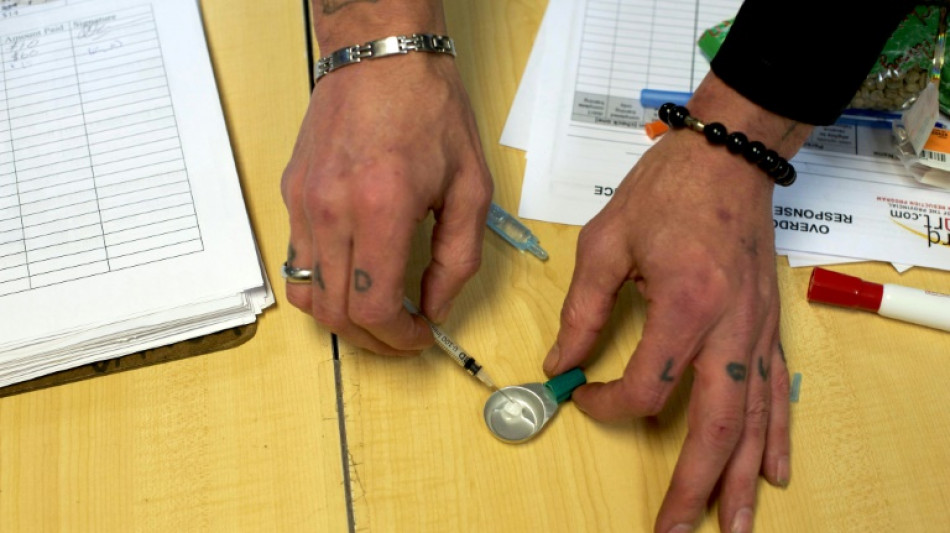
-
 Malaysia's Najib to face verdict in mega 1MDB graft trial
Malaysia's Najib to face verdict in mega 1MDB graft trial
-
King Charles calls for 'reconciliation' in Christmas speech

-
 Brazil's jailed ex-president Bolsonaro undergoes 'successful' surgery
Brazil's jailed ex-president Bolsonaro undergoes 'successful' surgery
-
UK tech campaigner sues Trump administration over US sanctions

-
 New Anglican leader says immigration debate dividing UK
New Anglican leader says immigration debate dividing UK
-
Russia says made 'proposal' to France over jailed researcher

-
 Bangladesh PM hopeful Rahman returns from exile ahead of polls
Bangladesh PM hopeful Rahman returns from exile ahead of polls
-
Police suspect suicide bomber behind Nigeria's deadly mosque blast

-
 AFCON organisers allowing fans in for free to fill empty stands: source
AFCON organisers allowing fans in for free to fill empty stands: source
-
Mali coach Saintfiet hits out at European clubs, FIFA over AFCON changes

-
 Last Christians gather in ruins of Turkey's quake-hit Antakya
Last Christians gather in ruins of Turkey's quake-hit Antakya
-
Pope Leo condemns 'open wounds' of war in first Christmas homily

-
 Mogadishu votes in first local elections in decades under tight security
Mogadishu votes in first local elections in decades under tight security
-
'Starting anew': Indonesians in disaster-struck Sumatra hold Christmas mass

-
 Cambodian PM's wife attends funerals of soldiers killed in Thai border clashes
Cambodian PM's wife attends funerals of soldiers killed in Thai border clashes
-
Prime minister hopeful Tarique Rahman arrives in Bangladesh: party

-
 Pacific archipelago Palau agrees to take migrants from US
Pacific archipelago Palau agrees to take migrants from US
-
Pope Leo expected to call for peace during first Christmas blessing

-
 Australia opts for all-pace attack in fourth Ashes Test
Australia opts for all-pace attack in fourth Ashes Test
-
'We hold onto one another and keep fighting,' says wife of jailed Istanbul mayor

-
 North Korea's Kim visits nuclear subs as Putin hails 'invincible' bond
North Korea's Kim visits nuclear subs as Putin hails 'invincible' bond
-
Trump takes Christmas Eve shot at 'radical left scum'

-
 3 Factors That Affect the Cost of Dentures in San Antonio, TX
3 Factors That Affect the Cost of Dentures in San Antonio, TX
-
Leo XIV celebrates first Christmas as pope

-
 Diallo and Mahrez strike at AFCON as Ivory Coast, Algeria win
Diallo and Mahrez strike at AFCON as Ivory Coast, Algeria win
-
'At your service!' Nasry Asfura becomes Honduran president-elect

-
 Trump-backed Nasry Asfura declared winner of Honduras presidency
Trump-backed Nasry Asfura declared winner of Honduras presidency
-
Diallo strikes to give AFCON holders Ivory Coast winning start

-
 Spurs captain Romero facing increased ban after Liverpool red card
Spurs captain Romero facing increased ban after Liverpool red card
-
Bolivian miners protest elimination of fuel subsidies

-
 A lack of respect? African football bows to pressure with AFCON change
A lack of respect? African football bows to pressure with AFCON change
-
Trump says comedian Colbert should be 'put to sleep'

-
 Mahrez leads Algeria to AFCON cruise against Sudan
Mahrez leads Algeria to AFCON cruise against Sudan
-
Southern California braces for devastating Christmas storm

-
 Amorim wants Man Utd players to cover 'irreplaceable' Fernandes
Amorim wants Man Utd players to cover 'irreplaceable' Fernandes
-
First Bond game in a decade hit by two-month delay

-
 Brazil's imprisoned Bolsonaro hospitalized ahead of surgery
Brazil's imprisoned Bolsonaro hospitalized ahead of surgery
-
Serbia court drops case against ex-minister over train station disaster

-
 Investors watching for Santa rally in thin pre-Christmas trade
Investors watching for Santa rally in thin pre-Christmas trade
-
David Sacks: Trump's AI power broker

-
 Delap and Estevao in line for Chelsea return against Aston Villa
Delap and Estevao in line for Chelsea return against Aston Villa
-
Why metal prices are soaring to record highs

-
 Stocks tepid in thin pre-Christmas trade
Stocks tepid in thin pre-Christmas trade
-
UN experts slam US blockade on Venezuela

-
 Bethlehem celebrates first festive Christmas since Gaza war
Bethlehem celebrates first festive Christmas since Gaza war
-
Set-piece weakness costing Liverpool dear, says Slot

-
 Two police killed in explosion in Moscow
Two police killed in explosion in Moscow
-
EU 'strongly condemns' US sanctions against five Europeans

-
 Arsenal's Kepa Arrizabalaga eager for more League Cup heroics against Che;sea
Arsenal's Kepa Arrizabalaga eager for more League Cup heroics against Che;sea
-
Thailand-Cambodia border talks proceed after venue row


Canada province to decriminalize hard drugs in small amounts
Canada announced Tuesday the decriminalization of hard drugs in small quantities in a British Columbia pilot project aiming to tame an opioid crisis that has killed thousands -- by treating addictions rather than jailing users for possession.
Responding to a request by British Columbia, federal Mental Health and Addictions Minister Carolyn Bennett said an exemption from the criminal code to allow for personal possession of opioids, cocaine, methamphetamine and other hard drugs would kick in on January 31, 2023 and last three years.
Adults in the Pacific coast province will not face arrest or charges for possession of up to 2.5 grams of hard drugs, nor will their drugs be seized by police.
Instead users will be provided with information on how to access medical help for addictions.
"For too many years, the ideological opposition to harm reduction has cost lives," Bennett told a news conference in announcing the pilot.
"We are doing this to save lives, but also to give people using drugs their dignity and choices," she said, adding that it could become "a template for other jurisdictions across Canada."
Kennedy Stewart, the mayor of Vancouver -- the epicentre of the crisis -- said the decision "marks a fundamental rethinking of drug policy that favors healthcare over handcuffs."
Calling it a "historic, brave and groundbreaking step in the fight to save lives from the poisoned drug crisis," he said it would also reduce petty crimes that often feed drug habits.
Several Canadian cities, including Montreal and Toronto, have signalled a desire for similar legal exemptions.
A small leftist faction in Parliament, the New Democratic Party, meanwhile, is to unveil Wednesday a proposed bill to decriminalize drug possession nationwide. It is expected to be defeated.
- 'Shame and fear' -
Bennett stressed that the exemption granted to British Columbia "is not legalization."
It will, however, make the province only the second jurisdiction in North America to decriminalize hard drugs after the US state of Oregon did so in November 2020.
Oregon's initiative has reportedly had mixed results as few people have taken up offers of addiction help.
Substances abuse has left thousands dead in British Columbia. Its Addictions Minister Sheila Malcolmson told AFP in November when it applied for the exemption that the province was facing "an overdose crisis that's causing a terrible loss of life."
The pandemic compounded its impacts, she said at Tuesday's news conference.
"Shame and fear keep people from accessing the care that they need," she explained. "And the fear of being criminalized has led many people to hide their addiction and use drugs alone. And using alone can mean dying alone."
Several drug users surveyed by AFP have said the amount of drugs allowed under the exemption is too small, as their daily consumption is far greater. Bennett acknowledged this but said it's a starting point.
She also said calls are growing louder for Ottawa to regulate a safe supply of hard drugs now often laced with toxic substances.
But first, she added, evidence must be collected from the pilot to show the approach works.
According to federal government data, 26,690 people have died of opioid overdoses across Canada from January 2016 to September 2021.
In British Columbia, an estimated six people die each day from opioid-related drug poisoning. Roughly 9,400 have died since public health officials declared the situation a public health emergency in 2016.
S.F.Warren--AMWN